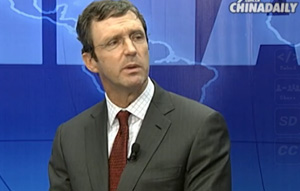FDI grows steadily amid reform drive
Updated: 2013-11-22 10:36
By Li Jiabao (China Daily Europe)
|
|||||||||||
Foreign direct investment in China grew steadily in the first 10 months of the year amid sweeping government reforms that are expected to reshape the world's second-largest economy.
FDI was up 5.77 percent year-on-year at $97.03 billion during the period, the Ministry of Commerce said on Nov 19.
October marks the ninth straight monthly increase in FDI, which rose 1.24 percent to $8.42 billion, compared with 4.88 percent in September and just 0.62 percent in August.
Investment from 10 Asian economies rose 7.18 percent to $83.63 billion, while that from the United States increased 12.41 percent to $3.04 billion.
European Union-sourced FDI went up 22.26 percent to $6.4 billion, said the ministry.
"China's FDI inflows were, on the whole, steady in the first 10 months. The country's economic growth, though slowing, is still outstanding in the world and retained the interest of global investors," says Wang Jun, an expert at the China Center for International Economic Exchanges.
"As the new leadership deepens economic reforms, including loosening investment access to the Chinese market, China will retain strong attractiveness to global investment over quite a long term. Overall, I'm optimistic, and I don't worry about FDI inflows," Wang says.
He adds that as traditional industries lose their competitiveness, high-end sectors - including research and development, design and services - will become more attractive to global investors, which is in line with the government's efforts to improve the quality and structure of FDI.
China pledged to loosen restrictions on overseas companies' access to the nation's markets and facilitate domestic companies' expansion abroad, according to the decision adopted at the Third Plenary Session of the 18th Central Committee of the Communist Party of China.
The full document was released by the Xinhua News Agency on Nov 15.
Shen Danyang, spokesman for the ministry, says that the ministry will improve the management of FDI reforms in four ways.
First, Shen says, the ministry will speed up the standardization of laws and regulations on overseas investment and Chinese investment to keep FDI policies steady, transparent and predictable.
"This is a profound measure in reforming China's FDI management mechanism and will help establish a common, fair and transparent access system," he says.
Second, the government will follow an orderly process in lifting controls on services including finance, education, culture and medical care and opening up sectors such as infant and elder care, architectural design, accounting and auditing, logistics and e-commerce.
"FDI in manufacturing, including iron and steel, chemicals and vehicles, will be further relaxed through loosening restrictions on registered capital, equity stakes and business scope," he says.
Foreign investors in China are urged to set up functional bodies such as regional headquarters, research and development centers, procurement centers and financial management centers. They are also urged to target spending on public technology service platforms, including innovation incubators, productivity centers and technology trading markets, Shen says.
Third, the ministry will focus on bringing in high-end talent and highly experienced technical managers.
Fourth, it will strive to establish a scientific FDI evaluation system, with a shift from considering the mere scale of investment to the improvement of quality and comprehensive benefits, Shen says.
In the January-October period, China's non-financial outward direct investment reached $69.5 billion, up 20 percent from a year earlier, according to the ministry.
About 90 percent of that money went into just five industries: commercial services, mining, wholesale and retail, manufacturing and construction.
In the same period, investment to seven destinations - Hong Kong, the Association of Southeast Asian Nations, the EU, Australia, the US, Russia and Japan - accounted for 70 percent of the total, or $48.9 billion, up 7 percent year-on-year.
Investment to Japan slid 37.3 percent year-on-year while that to Russia surged 858 percent and that in the US was up 227 percent, says the ministry.
A report from the Institute of World Economics and Politics of the Chinese Academy of Social Sciences said on Nov 18 that it is the "best time" for Chinese companies to invest overseas.
The report said that developed economies, despite having strong economic fundamentals and low political risks, will grow slowly in the near future owing to heavy debt burdens.
Despite steady FDI flows into China, Shen expresses caution on near-term export prospects owing to an uncertain recovery of global demand, rising costs in China and intensified global competition.
"In the next two months, as well as in the longer term, China's exports will continue to face difficulties from many sources," Shen says.
lijiabao@chinadaily.com.cn
(China Daily European Weekly 11/22/2013 page19)
Today's Top News
Premier Li heads west on opening-up tour
Deal reached in Iranian nuke talks
Roar of the East being heard
New air zone in line with practice
UN talks agree on major principles for climate pact
China maps out air defense ID zone
Nokia has 'phab' plan for Chinese mobile market
Newtown investigation report to be released
Hot Topics
Lunar probe , China growth forecasts, Emission rules get tougher, China seen through 'colored lens', International board,
Editor's Picks

|

|

|

|

|

|





